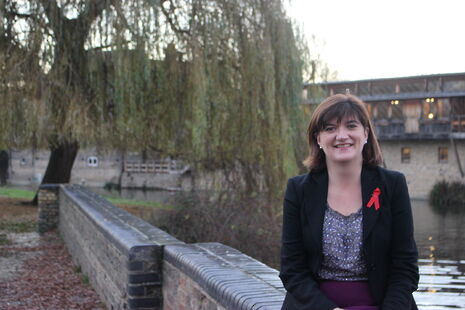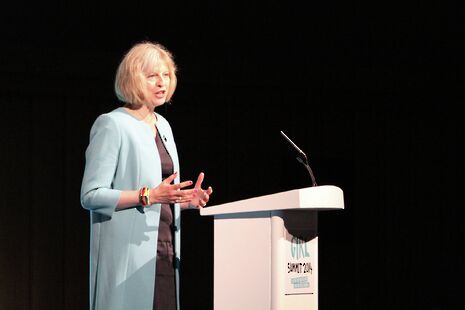Nicky Morgan: May ‘doesn’t mind people talking about what she’s wearing’
Anna Jennings chats to Nicky Morgan about challenging the system, the difference between male and female MPs, and Theresa May’s relationship with fashion

Nicky Morgan has been making headlines recently for her texting row with Theresa May. Before this scandal, I sat down with the Conservative MP and ex-education secretary in the Varsity offices to discuss feminism in politics, the House of Lords, and the current Prime Minister.
I couldn’t resist asking Nicky Morgan how she would describe Theresa May. The relationship between the two is presumably far from friendly, after May removed Morgan from the Cabinet – about which Morgan is stoical, claiming “I think Prime Ministers are entitled to have around them exactly who they want… If my face doesn’t fit, well that’s a decision that that Prime Minister is entitled to make”. These days, Morgan is a vocal backbencher, a role she is positive about, explaining that “it’s quite liberating to be on the backbenches and to be able to say what you think”.
She is guarded in her response about the Prime Minister. “Theresa’s a very strong and capable Prime Minister… But it’s very early days. I mean she’s been there for less than six months”. She continues: “I don’t know her very well, I mean I don’t know her on a social basis… I think she herself said recently that one of the things that made her very angry […] was injustice, and I think that’s probably right. I think she is very serious about taking on injustices wherever she finds them, whether it’s as Home Secretary or Prime Minister. I think she’s phenomenally hard-working, I think she gets to grips with issues, I think that she’s determined to deliver for people”.
Rather presciently, we ended up talking about fashion. “I don’t think anyone’s commented on, you know, my fashion and frankly I’m not bothered about that … Theresa May, as far as I’m aware, doesn’t mind people talking about what she’s wearing and her shoes, and I think that’s very much a part of who she is and that’s good because I think people should comment about all sorts of different things.” Now, I cannot help but wonder if this view extends to Morgan’s recent comments on May’s leather trousers – and whether the Prime Minister would agree.
Her description of May is largely positive, but when Morgan drifts into criticism, she quickly feels a need to generalise. “I think she herself would say that she’s not a person to sit back in the […] bars of Whitehall and chat to people but that’s also quite a male-female difference”.
Throughout the interview, Morgan voices quite strong opinions about the divide between men and women. Here, she justifies that ‘male-female difference’: “I think a lot of the women in Westminster don’t spend their time sitting there, chatting away in the pubs and the bars. We’re there to do a job and we want to get on with it.”
When asked if there is a difference between male and female MPs, Morgan is clear that there is. “There are no such things as women’s issues, I mean women have views like everybody else does on everything but I think what women do bring is a difference in terms of tone and the type of discussions that we have. They will be thinking perhaps about different things, different aspects of debates […] whether we’re talking about going to war, or conflict, or whether we’re talking about the VAT on sanitary products.”
And yet, when I ask her a gendered question about how she has found juggling being an MP and a mother, she shuts me down quickly, asking: “is that a question you’d ask a male MP if they came here?” Well played, Morgan.
She is adamant in her calls for gender equality in politics. “I’d like to think we’d get to a 50/50 Parliament,” she tells me, explaining that “it’s really important that Parliament looks like the country that we aspire to represent, and certainly in the case of the House of Commons […] we’ve got further to go.”
How is this gender equality to be achieved? We talk about quotas and targets (Morgan favouring the latter), but she also expresses a need to change the way in which we talk about politics. “I think that the way that the language of politics is, you know people are battling, they’re taking each other on, it’s quite aggressive, and I think that puts off an awful lot of women. It puts off a lot of women readers I’d suggest.”
She expands, “you have to work within the rules to get to leadership positions, but that doesn’t mean you don’t challenge them, and that doesn’t mean that when you have an opportunity to change them, you don’t change them. So I think it’s incumbent on women who are in positions in politics not to just accept the language that’s used and the way things are expressed and the decisions that are taken, but to make sure that when you get there you challenge as well, and you change things.”

She is also vocal about the need to reform the House of Lords. “I do think now that the House of Lords is too big, I think a lot of peers aren’t there… they’re appointed but actually they’re not there to act as the second chamber. And I think that Parliament has to keep asking itself – I think particularly in light of what’s happened – are we the right institution?”
In light of what’s happened, then, I ask her about Brexit. She states that “we’re all post-Brexit now”, seeing the urgent question as being how Article 50 is triggered, pending on the Supreme Court case. “I think MPs are incredibly mindful of how their constituents voted on the 23rd of June. But I think we’re also there […] to offer our judgement about what’s right in the national interest and in our constituents’ interest. And I don’t think that in leaving the EU, the government wants to fatally undermine our economy, our constitution or our values, and I think that’s something that we have to be mindful of.”
Morgan is no stranger to the conflicting loyalties of the party, constituents and personal views. Her vote against same-sex marriage made headlines, which she explained as being compelled by the views of her constituents. I was interested as to how this translates to Brexit. She suggests “there will be times when you actually say no, this is something that’s too important locally or too important for me personally that I can’t actually follow my party into the lobby. But you try to minimise those opportunities because actually the party is stronger when you’re all working together.”
When asked what her personal view is on the best way to Brexit, she avoids giving an answer. “I mean the big debate is going to be around sort of access to the single market and this issue about freedom of movement of people and, yes, I think people want to see a controlled immigration policy, but I think it’s also really important that we are clear with people about the benefits of being in the single market, or our businesses having access to the single market, and the impact this then has on jobs and livelihoods, if businesses can’t expand.”
She expresses concern about a rise in racist language and hate crimes surrounding the referendum vote, and agrees that her party must be guarded against it. “I think the Conservative party is at its best when it’s appealing to mainstream majority, when it’s showing its compassionate commitment to social justice and I think that if we pander to any of this language, harsh language about immigrants or refugees, then that is something to be deeply regretted.”
This is a problem she ties in part to the media coverage of Brexit. “There’s some really big, meaty issues facing this country at the moment, about our position in the world, our position in terms of negotiating agreements with our continental neighbours, and I think it’s incumbent on those covering politics to ask if they’re really getting to grips with those big issues, or just kind of floating along the top with some of the issues that actually people might like to read about, but they belong in diary columns, not in hard political articles”.
Those leather trousers, and the text messages then? One of the big issues, or just something we like to read about? The question is ours to answer
 Arts / Why Cambridge’s architecture never lives up to the ‘dark academia’ dream 17 October 2025
Arts / Why Cambridge’s architecture never lives up to the ‘dark academia’ dream 17 October 2025 Lifestyle / My third year bucket list17 October 2025
Lifestyle / My third year bucket list17 October 2025 Sport / Between ambition and responsibility: Cambridge United and the future of lower-league football17 October 2025
Sport / Between ambition and responsibility: Cambridge United and the future of lower-league football17 October 2025 News / How much does your college master earn?17 October 2025
News / How much does your college master earn?17 October 2025 Features / Beyond reality checkpoint: local businesses risking being forced out by Cambridge’s tourism industry15 October 2025
Features / Beyond reality checkpoint: local businesses risking being forced out by Cambridge’s tourism industry15 October 2025









